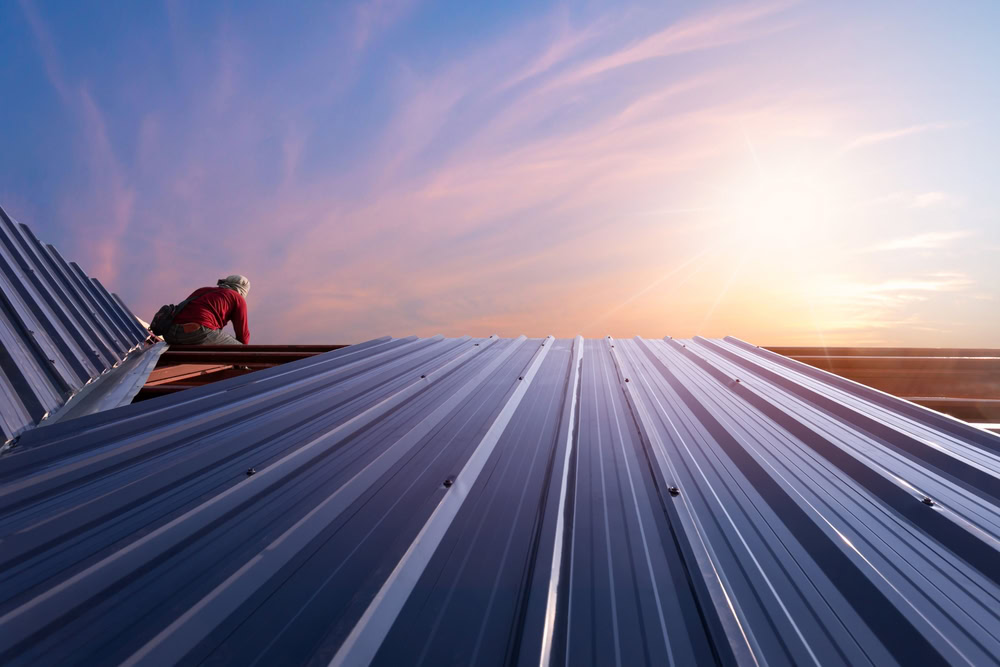As homeowners consider options for new roofs, a common question pops up: Do metal roofs really last longer? The answer is yes, metal roofs last longer than most other traditional options.
However, that isn’t the end of the conversation, as there are plenty of pros and cons to consider when looking at a metal roof. Let’s dive into those factors in the sections below.
How Long Do Metal Roofs Last?
Metal roofs have earned a reputation for outlasting traditional roofing materials by a healthy margin. While the typical asphalt shingle roof lasts between 15 to 30 years, a well-installed metal roof can protect your home for 40 to 70 years or more. In fact, some high-quality materials like copper can even surpass the century mark!
But what makes metal roofs so durable? It’s a combination of factors:
- Resilient Materials: Metal roofing is naturally resistant to many of the issues that plague other materials. It doesn’t rot, crack, or become susceptible to insect damage.
- Weather Resistance: Metal roofs excel at handling extreme weather conditions, from intense heat to heavy snow and high winds.
- Low Maintenance: Unlike other roofing types that require frequent upkeep, metal roofs need minimal maintenance to keep their protective qualities.
Types of Metal Roofing and Their Lifespan
Not all metal roofs are created equal. At Above & Beyond Roofing, we offer several types of metal roofing, each with its own benefits:
- Steel Roofs: Lasting 30-50 years, steel is a popular choice for its strength and affordability.
- Aluminum Roofs: With a lifespan of 40-60 years, aluminum is excellent for coastal areas due to its corrosion resistance.
- Copper Roofs: The premium choice, copper roofs can last 80-100 years or more, developing a beautiful patina over time.
- Zinc Roofs: Another long-lasting option, zinc roofs can endure for 50-100 years with proper care.
Comparing Cost and Value
While it’s true that metal roofs usually have a higher upfront cost compared to asphalt shingles, it’s important to consider the long-term value. When you factor in the extended lifespan and reduced maintenance needs, a metal roof often proves to be a more cost-effective choice over time.
Moreover, metal roofs can lead to energy savings. Their reflective properties help reduce cooling costs in summer, potentially lowering your energy bills. Some homeowners report savings of 10-25% on their cooling costs after installing a metal roof.
Common Metal Roof Myths
As experienced roofing professionals, we often encounter misconceptions about metal roofs. Let’s address a few:
- Noise: Contrary to what seem people might tell you, properly installed metal roofs are not noisier than other types. Modern installation techniques, including solid sheathing and insulation, can minimize noise from rain or hail.
- Lightning Risk: Metal roofs do not increase the likelihood of lightning strikes. In fact, metal roofs can provide additional protection as they’re non-combustible.
- Denting: Quality metal roofing is highly resistant to denting, even from hailstorms. Also, many metal roofs come with warranties against denting.
Installation: The Key to Metal Roof Longevity
At Above & Beyond Roofing, we can’t stress enough the importance of proper installation. Even the highest quality metal roof won’t perform to its potential if not installed correctly. That’s why we use only the best installation practices with our team of experts.
Some key aspects of proper metal roof installation include:
- Correct underlayment to prevent moisture issues
- Proper fastening techniques to ensure the roof can withstand high winds
- Adequate ventilation to prevent heat and moisture buildup
- Appropriate flashing around chimneys, vents, and other roof penetrations
Environmental Benefits of Metal Roofing
For environmentally conscious homeowners, metal roofs offer several green benefits:
- Recyclability: Most metal roofing materials are 100% recyclable at the end of their life.
- Energy Efficiency: As mentioned earlier, metal roofs can help reduce energy costs.
- Longevity: The extended lifespan means less frequent replacements and less waste in landfills.
Maintenance Tips for Metal Roofs
While metal roofs require less maintenance than many alternatives, some basic care can help maximize their lifespan:
- Regular Inspections: We recommend annual inspections to catch any issues early.
- Keep it Clean: Remove debris like leaves or branches that could trap moisture.
- Check Fasteners: Occasionally, fasteners may need tightening or replacing.
- Address Issues Promptly: If you notice any damage or leaks, have them repaired quickly to prevent larger problems.
Is a Metal Roof Right for Your Home?
While metal roofs offer numerous advantages, they’re not the only option. At Above & Beyond Roofing, we believe in finding the right solution for each homeowner’s unique needs. Factors to consider include:
- Budget: Both short-term and long-term costs
- Home Architecture: Some styles complement metal roofing better than others
- Local Climate: Consider factors like heat, cold, and moisture in your area
- Personal Preferences: Including aesthetics and environmental concerns
We’re here to help you navigate these considerations and find the best roofing solution for your home.
Best Roofing Options to Invest in Your Home’s Future
Choosing a new roof is a significant decision, and longevity is a crucial factor to consider. Metal roofs consistently outperform traditional materials in this aspect, offering decades of protection with minimal maintenance.
At Above & Beyond Roofing, we’ve seen firsthand how metal roofs can provide homeowners with peace of mind and long-term value. From their durability and energy efficiency to their environmental benefits, metal roofs represent a smart investment in your home’s future.
Remember, the key to maximizing any roof’s lifespan lies in quality materials and expert installation. That’s where our team’s experience and commitment to excellence come into play. We’re not just installing a roof; we’re protecting your home and everything under it.


 (908) 588-9575
(908) 588-9575